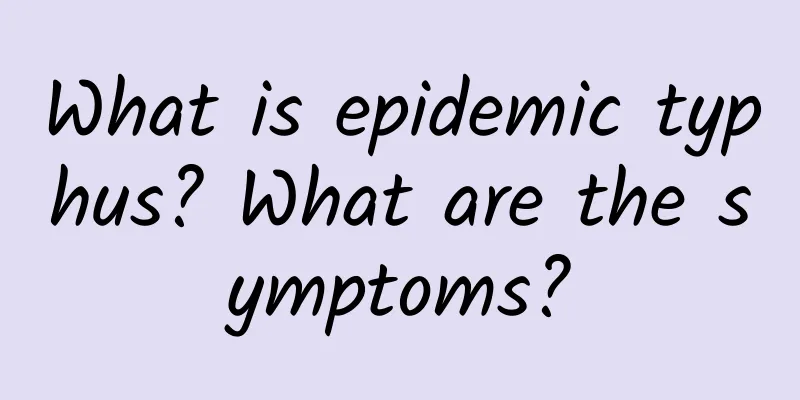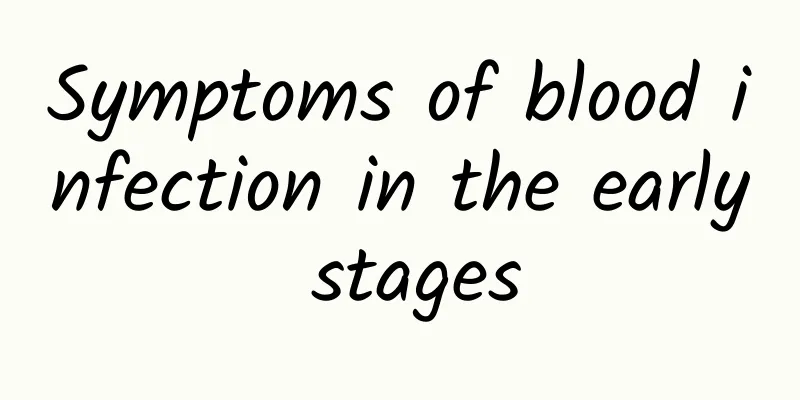What is epidemic typhus? What are the symptoms?

|
Epidemic typhus, also known as louse-borne typhus, is an acute infectious disease transmitted by Rickettsia prowazekii through body lice. So what are the symptoms of this disease? How to treat it? Epidemiology: Source of infection: The patient is the only source of infection, and the disease is most contagious in the first week of onset. Transmission route: Body lice are the main vector of transmission. Susceptible population: People are generally susceptible and can develop a certain immunity after the disease. This disease is more common in winter and spring because the climate is cold, clothes are thicker and are rarely changed and washed, which is conducive to the parasitism and reproduction of lice. Common symptoms: The incubation period ranges from 5 to 21 days, with an average of 10 to 12 days. Its clinical features are persistent high fever, headache, petechial rash (or maculopapular rash) and central nervous system symptoms, and the natural course is 2 to 3 weeks. 1) Rash is an important sign, seen in more than 80% of cases. It appears on the 4th to 6th day of the disease, first seen on the chest, back, armpits, and both sides of the upper arms, and quickly spreads to the whole body within one day. There is usually no rash on the face, which disappears in 5 to 7 days. The petechial rash may last for 1 to 2 weeks, leaving brown-yellow spots or desquamation. 2) Neurological symptoms are obvious and appear very early, manifested as panic, excitement, severe headache, and may be accompanied by dull consciousness, delirium, and occasionally meningeal irritation signs, muscle and tongue tremors, coma, incontinence, dysphagia, hearing loss, etc. Laboratory tests: 1) Routine blood test: cell count is mostly normal, and eosinophils are significantly reduced or disappeared. 2) Serological tests: It is advisable to take two or three serum samples (at initial admission, in the second week of illness, and during recovery). Those with a titer increase of more than 4 times have diagnostic value. Commonly used ones include Weil-Fisch test, complement fixation test, rickettsial agglutination test, indirect hemagglutination test, etc. 3) Molecular biology examination: Use DNA probe or PCR method to detect Rickettsia prowazekii-specific DNA, which has the advantages of rapidity, specificity and sensitivity. treat 1) General treatment: After admission, change clothes, kill lice, and rest in bed. Keep your mouth and skin clean. Critically ill patients should be turned over frequently to prevent complications. Provide a high-calorie semi-liquid diet and about 3000 ml of water per day. Patients with high fever can undergo physical cooling or be given small doses of antipyretic drugs. 2) Pathogen treatment: Chloramphenicol and tetracycline drugs are both effective for this disease. Generally, symptoms begin to ease more than ten hours after taking the medicine, and the fever disappears completely within 2 to 3 days. There are also reports that the use of erythromycin, fluoroquinolones and minocycline to treat this disease has also achieved good results. Prognosis: Due to effective antibiotic therapy, the mortality rate of this disease has dropped significantly. |
<<: How effective is the weight loss effect of soaking hawthorn and lotus leaves in water?
Recommend
What should I do if I have folliculitis on my male genitals?
Some men's genitals may suffer from folliculi...
Can I eat peanuts if I have high uric acid?
People with high uric acid should be careful not ...
What are the benefits of washing the vulva with toothpaste?
We all know that women are very clean, maybe it&#...
What are the benefits of moxibustion on the entire sole of the foot?
There are many acupoints in our human body, and t...
Treating tumors with traditional Chinese medicine
In recent years, we have studied and found that t...
When should moxibustion be done?
Some female friends may hope to achieve beauty th...
What happens if gout is severe? Beware of life-threatening conditions
As people pay more attention to some serious dise...
Why does redness, swelling and itching occur after applying Sanfu plaster?
From the perspective of traditional Chinese medic...
How do women know what their body type is?
According to traditional Chinese medicine, a pers...
How to prevent epilepsy caused by brain trauma?
Epilepsy is what we often call epilepsy. There ar...
Five ways to maintain your stomach
Maybe because of genetics, my stomach has been in...
Failure of fertilized egg implantation
Conception is a very wonderful thing. It not only...
Effects of Shiwei
Shiwei is a plant that grows in the cracks of roc...
Which department should I go to for tongue ulcer?
With the improvement of medical conditions today,...
What is the color of the tongue coating caused by kidney yin deficiency?
The shape, size, color, etc. of the tongue can re...









